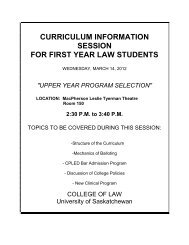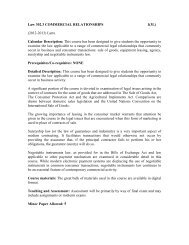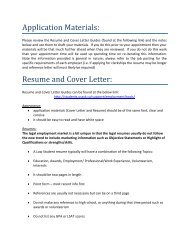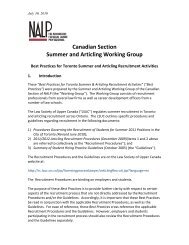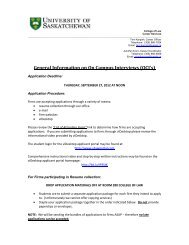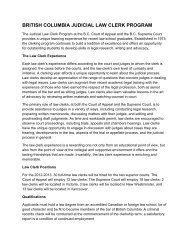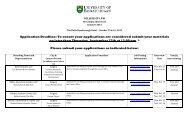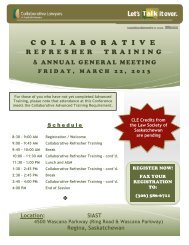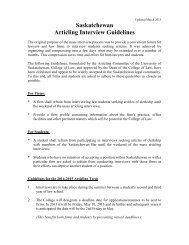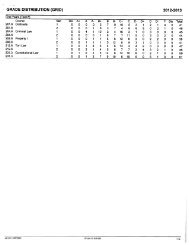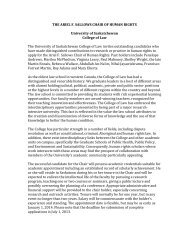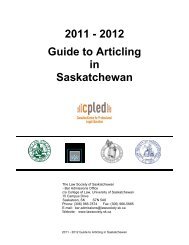2010 of NOTE - College of Law - University of Saskatchewan
2010 of NOTE - College of Law - University of Saskatchewan
2010 of NOTE - College of Law - University of Saskatchewan
Create successful ePaper yourself
Turn your PDF publications into a flip-book with our unique Google optimized e-Paper software.
etirements<br />
Pr<strong>of</strong>essor Ron Fritz<br />
After 34 years, Pr<strong>of</strong>essor<br />
Ron Fritz said, “it’s time to<br />
retire.” His journey into law<br />
began in Ontario, where<br />
he received his LL.B. from<br />
the <strong>University</strong> <strong>of</strong> Windsor<br />
in 1971, then further<br />
to the London School <strong>of</strong><br />
Economics to complete<br />
his LL.M. He returned to<br />
a two year stint in Ottawa<br />
at the <strong>Law</strong> Reform Commission<br />
<strong>of</strong> Canada’s Family<br />
<strong>Law</strong> Project, then came to<br />
the <strong>University</strong> <strong>of</strong> <strong>Saskatchewan</strong>.<br />
While his graduate work<br />
was in corporate law, insurance<br />
law, and intellectual property, he became the Family<br />
<strong>Law</strong> Pr<strong>of</strong>essor on Faculty. “Some years I taught as many as<br />
three Family <strong>Law</strong> <strong>of</strong>ferings,” he notes. He revised the structure<br />
<strong>of</strong> the course and the curriculum and has even received<br />
some nice compliments. At a First Year Banquet recently, the<br />
guest speaker said, “I’d like to thank Pr<strong>of</strong>essor Fritz. I made<br />
a lot <strong>of</strong> money <strong>of</strong>f your materials.”<br />
There are many highlights in his long career. “One <strong>of</strong> the<br />
advantages <strong>of</strong> being an academic,” he said, “is that you can<br />
follow your interests with a lot <strong>of</strong> freedom. In 1990 I became<br />
quite concerned about <strong>Saskatchewan</strong>’s electoral boundaries<br />
legislation. I helped form The Society for the Advancement<br />
<strong>of</strong> Voter Equality. The group persuaded the government to<br />
do a constitutional reference to the Court <strong>of</strong> Appeal, which<br />
agreed with our concerns but the Supreme Court <strong>of</strong> Canada<br />
disagreed.”<br />
Nevertheless, his interest in electoral boundaries continued<br />
and he later became the vice-chair <strong>of</strong> the federal electoral<br />
boundaries commission for <strong>Saskatchewan</strong>. “Our work was<br />
very controversial,” he laughs. “We produced boundaries that<br />
were subject to excoriating criticism. Indeed a House <strong>of</strong> Commons<br />
committee said our work was a waste <strong>of</strong> government<br />
money.” The controversial idea was mixing urban and rural<br />
voters. After the next census a new commission for <strong>Saskatchewan</strong><br />
was appointed, and they came out with a version<br />
which was even less well received. “What they did then is they<br />
reverted to what we had done.”<br />
Freedom Highlights <strong>Law</strong> Career<br />
He also felt honoured to be involved with the case <strong>of</strong> 12<br />
year old Tyrell Dueck, who had cancer in one <strong>of</strong> his legs,<br />
and decided he did not want further treatment. The question<br />
before the court was whether he was a mature minor capable<br />
<strong>of</strong> making his own decision. “I provided some advice<br />
to the lawyer hired by the family,” he says. “I also decided to<br />
infuse into my torts class an element <strong>of</strong> consent to medical<br />
treatment.” The Court ordered the treatment, but by then<br />
the cancer had spread to other organs and the oncologist<br />
thought treatment would not help. “The family held an event<br />
and publicly thanked me for my contribution and I didn’t<br />
think I’d done a great deal. But I was interviewed by As It<br />
Happens, which, in terms <strong>of</strong> an academic’s lifetime, is probably<br />
the pinnacle,” he laughs.<br />
Another highlight was Admissions. “In my very first year here<br />
I was put onto the Admissions Committee,” he says. “I found<br />
it very interesting and fulfilling, being able to champion the<br />
case <strong>of</strong> certain applicants, and seeing it turn out beautifully<br />
for them; I must say I got a charge out <strong>of</strong> that on a number<br />
<strong>of</strong> occasions.”<br />
He helped draft a constitution for a new national Admissions<br />
organization, then helped Canadian Common <strong>Law</strong> schools to<br />
gain full status on the <strong>Law</strong> School Admissions Council, which<br />
is responsible for the LSAT. He was elected to the Board <strong>of</strong><br />
Trustees <strong>of</strong> the Council, the first Canadian to do so. He served<br />
on the Board for two years and in a number <strong>of</strong> other capacities<br />
after that. “As a result <strong>of</strong> the work <strong>of</strong> a sub-committee that<br />
I chaired, the development <strong>of</strong> the test was much more sensitive<br />
to Canadian concerns.”<br />
Another one <strong>of</strong> his lasting contributions to the <strong>Law</strong> School<br />
is the endowment <strong>of</strong> the Fritz Prize for the second place<br />
graduate. “The T. D. Brown Prize has been given for years,”<br />
he says, “and I thought it unfortunate for someone who does<br />
so well and stands in second place, yet the only person we<br />
are recognizing is the top graduate.”<br />
His wife Linda worked for many years in the <strong>University</strong> library<br />
system and retired as the Head <strong>of</strong> Special Collections. In<br />
2002 they bought a heritage house in Queenston, Ontario,<br />
near Niagara-on-the-Lake. He and Linda have now retired<br />
to their new home, and to Ron’s original roots in Ontario.<br />
He has no immediate plans. “Maybe sit on a committee, but<br />
nothing structured at this time. Just see how it goes.” n<br />
– Peter T. Derbawka<br />
Pr<strong>of</strong>essor Ken Cooper-Stephenson<br />
The Tortmeister<br />
In June 2009 Pr<strong>of</strong>essor Ken Cooper-<br />
Stephenson retired as a pr<strong>of</strong>essor at<br />
the <strong>College</strong> <strong>of</strong> <strong>Law</strong>, a position he held<br />
since 1971. Ken’s retirement brings to<br />
an end a long and distinguished career<br />
as a teacher, scholar and administrator<br />
– the three necessary attributes <strong>of</strong> a<br />
valued colleague and faculty member.<br />
Affectionately known as “Coop”, he<br />
was a thoroughly dedicated teacher<br />
who always put the students’ interest<br />
first. Pr<strong>of</strong>essor Cooper-Stephenson<br />
will be best known to the alumni <strong>of</strong> the<br />
<strong>College</strong> <strong>of</strong> <strong>Law</strong> as a Torts pr<strong>of</strong>essor,<br />
particularly the basic, most significant<br />
first year Torts course, throughout<br />
his career in the <strong>College</strong>. This in itself<br />
would expose him to one-half <strong>of</strong> the<br />
entire <strong>College</strong>’s student population.<br />
When his senior level courses are<br />
added in, it is estimated that Ken has<br />
taught approximately 65-70% <strong>of</strong> the<br />
students at the <strong>College</strong> <strong>of</strong> <strong>Law</strong> in the<br />
past four decades.<br />
Ken’s commitment to teaching was<br />
second to none. In addition to meticulous<br />
preparation for his classes,<br />
he would selflessly give his time to<br />
students outside the classroom. It was<br />
not uncommon to see students lined<br />
up outside his <strong>of</strong>fice waiting to discuss<br />
fine points <strong>of</strong> the law with him, or to<br />
review written assignments and receive<br />
the additional benefit <strong>of</strong> his one-on-one<br />
tuition.<br />
For many years, Ken was the faculty<br />
editor <strong>of</strong> the <strong>Saskatchewan</strong> <strong>Law</strong><br />
Review. This position involved working<br />
very closely with a small group <strong>of</strong><br />
excellent students to publish the law<br />
school’s venerable journal. His ability<br />
to mentor the student editors, and<br />
dedicate innumerable hours to the<br />
task, resulted in the publication <strong>of</strong> one<br />
<strong>of</strong> Canada’s best law journals.<br />
Ken Cooper-Stephenson ranks in<br />
the very top echelon <strong>of</strong> legal scholars<br />
who have taught at western Canada’s<br />
oldest law school. In 2001, Ken was<br />
awarded an earned LL.D. from The<br />
<strong>University</strong> <strong>of</strong> London (England). As one<br />
<strong>of</strong> Canada’s most prolific and eloquent<br />
legal writers, he wrote no fewer than<br />
three substantial books that firmly<br />
entrenched him as an international<br />
Torts scholar. His seminal work is the<br />
1,000 page, Personal Injury Damages<br />
in Canada, first published in 1981, and<br />
then extensively rewritten in its second<br />
edition in the mid-90’s. It is perhaps the<br />
most thorough treatise on the assessment<br />
and quantification <strong>of</strong> damages<br />
for personal injury and death claims.<br />
Although written from a Canadian<br />
perspective and focusing on Canadian<br />
law, the fundamental principles are<br />
transferable to all jurisdictions in the<br />
common law world. Most particularly,<br />
his analysis <strong>of</strong> the principles <strong>of</strong> causation<br />
have been cited and taught by<br />
legal scholars in several countries. The<br />
book is first class in every respect.<br />
Ken also wrote a ground breaking<br />
book dealing with damages for the<br />
infringement <strong>of</strong> rights guaranteed by<br />
the Canadian Charter <strong>of</strong> Rights and<br />
Freedoms. Charter Damages Claims<br />
has been cited numerous times by the<br />
courts, including the Supreme Court <strong>of</strong><br />
Canada and the South African Constitutional<br />
Courts. The work looks beyond<br />
Canada to examine American constitutional<br />
tort cases, and awards <strong>of</strong> just<br />
satisfaction by the European Court <strong>of</strong><br />
Human Rights.<br />
In addition to these two books, Pr<strong>of</strong>essor<br />
Cooper-Stephenson also co-edited<br />
a book on tort theory and wrote a<br />
thorough review <strong>of</strong> the <strong>Saskatchewan</strong><br />
no-fault automobile accident insurance<br />
scheme. He made recommendations<br />
for improvement <strong>of</strong> the plan including<br />
an extension <strong>of</strong> tort law in the automobile<br />
accident field. The report, written<br />
for the Government <strong>of</strong> <strong>Saskatchewan</strong>,<br />
became a template for major legislative<br />
change in the Province.<br />
Ken’s record <strong>of</strong> publications includes<br />
an extensive number <strong>of</strong> articles and<br />
writings in a broad variety <strong>of</strong> legal journals<br />
and other forums. He had a love<br />
for literature and movies which had a<br />
way <strong>of</strong> insinuating<br />
themselves into<br />
his writings. One<br />
article was titled<br />
“Sense and Sensibility”,<br />
another<br />
“Sliding Doors”<br />
and a third “The<br />
Fairest <strong>of</strong> Them<br />
All”.<br />
In his nearly four<br />
decades at the<br />
<strong>College</strong> <strong>of</strong> <strong>Law</strong><br />
Ken was a major<br />
contributor to the<br />
administration <strong>of</strong><br />
the program and<br />
the governance <strong>of</strong><br />
both the <strong>College</strong><br />
and the <strong>University</strong>.<br />
He chaired virtually<br />
every <strong>College</strong><br />
committee and<br />
at any given<br />
time throughout<br />
his career was<br />
a member <strong>of</strong> a Pr<strong>of</strong>essor Ken Cooper-Stevenson<br />
major <strong>University</strong> and Pr<strong>of</strong>essor Heather Jensen<br />
committee as the<br />
at the retirement and<br />
<strong>College</strong>’s repre-<br />
farewell reception.<br />
sentative. In addition,<br />
he served as Assistant Dean first<br />
in the 1980s and again in the 1990s.<br />
With his retirement, the <strong>College</strong> <strong>of</strong> <strong>Law</strong><br />
has lost one <strong>of</strong> the great law teachers<br />
and scholars in Canada. Ken Cooper-<br />
Stevenson is a person who exemplified<br />
the essence <strong>of</strong> the true <strong>University</strong><br />
pr<strong>of</strong>essor: industrious, intelligent, sensitive<br />
and humorous. Throughout his<br />
career, Ken was such an intensive legal<br />
scholar that it is expected he will not<br />
easily leave his role behind. It will not<br />
be a surprise if we soon see another<br />
major contribution to legal scholarship<br />
by Pr<strong>of</strong>essor Ken Cooper-Stephenson.<br />
We are honoured that Ken has accepted<br />
the title <strong>of</strong> Pr<strong>of</strong>essor Emeritus<br />
in the <strong>College</strong> <strong>of</strong> <strong>Law</strong>, <strong>University</strong> <strong>of</strong><br />
<strong>Saskatchewan</strong>. n<br />
18 <strong>2010</strong> <strong>of</strong>Note www.usask.ca/law <strong>University</strong> <strong>of</strong> <strong>Saskatchewan</strong> <strong>College</strong> <strong>of</strong> <strong>Law</strong> Alumni Magazine www.usask.ca/law <strong>of</strong> <strong>College</strong> <strong>of</strong> <strong>Law</strong> Alumni Magazine www.usask.ca/law Note <strong>2010</strong> 19<br />
<strong>of</strong> 18 <strong>2010</strong> Note <strong>2010</strong> 19<br />
<strong>of</strong>Note www.usask.ca/law <strong>University</strong> <strong>of</strong> <strong>Saskatchewan</strong><br />
– Dan Ish



